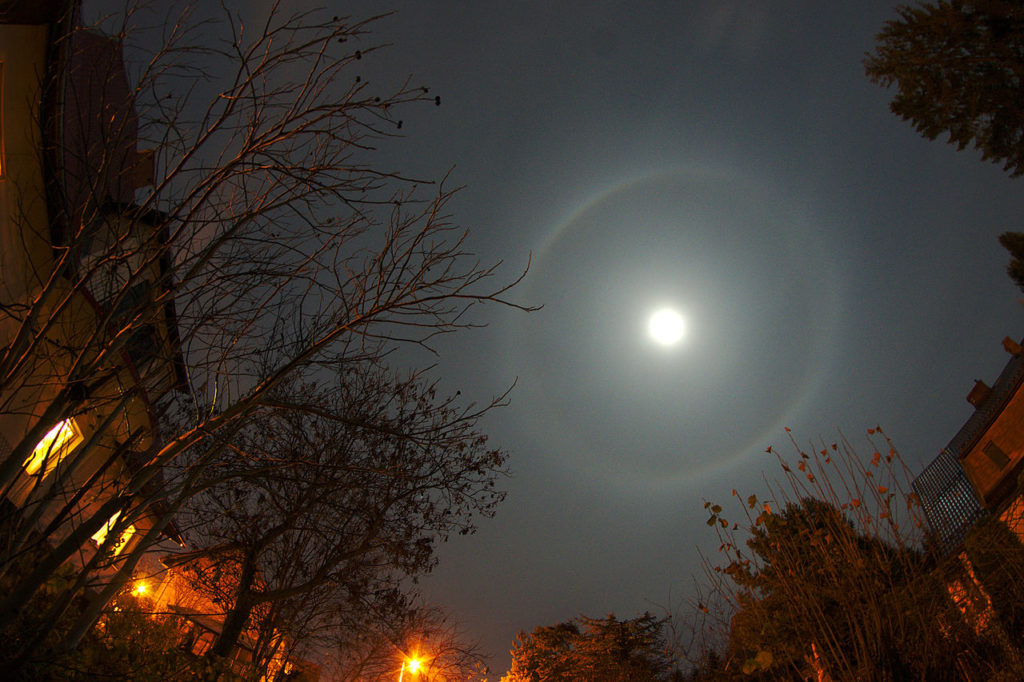If what you see is like looking at a streetlight through a frosted window, that is a true halo. Does cataract surgery cause halos?
What Causes Halo In Vision, Cloudy vision and halos can generally be caused by anything that interferes with light entering the eye, including hazy glasses or contact lenses. It is often caused by water mist between you and the light.

But a visual migraine headache could also be a symptom of a stroke, which can be fatal. The symptoms and possible related eye conditions/diseases in this section are for general reference only, and do not contain all visual symptoms or all possible related conditions or diseases. Glaucoma glaucoma occurs when the optic nerve becomes damaged due to high inner eye pressure, and is a leading cause of blindness worldwide. Seeing halos can be especially problematic at night or in a dimly lit space, when they’re more likely to interfere with your vision.
Vision trends of long point local cataract, astigmatism, fuch’s dystrophy and glaucoma eye exams and treatment near you in houston, texas.
When light bends as it enters your eye — called diffraction — your eyes perceive that halo effect. Halos are often normal responses to bright lights. It is often caused by water mist between you and the light. People with diabetes may develop diabetic eye disease, causing vision loss and even blindness. Kaleidoscopic vision is most often caused by a type of migraine headache known as a visual or ocular migraine. Kaleidoscope vision can be serious.
 Source: pinterest.com
Source: pinterest.com
A visual migraine occurs when nerve cells in the part of your brain responsible for. Side effects of eye surgery include vision loss, halos of light, glare, double vision, dry eyes, and more. It is often caused by water mist between you and the light. Vision trends of long point local cataract, astigmatism, fuch’s dystrophy and glaucoma eye exams and.

Does cataract surgery cause halos? When light bends as it enters your eye — called diffraction — your eyes perceive that halo effect. Halos are troublesome, bright circles of light that surround headlights and other light sources. Halos are often normal responses to bright lights. Many individuals who get ocular migraines tend to have them occur in clusters.
 Source: lancashireeyeclinic.co.uk
Source: lancashireeyeclinic.co.uk
Aging causes the vitreous gel of the eye to shrink and pull away from the back wall of the eye. When light bends as it enters your eye — called diffraction — your eyes perceive that halo effect. Read on to learn what can cause halos and when they’re a reason to visit an eye doctor near you. When light.
 Source: decoratingspecial.com
Source: decoratingspecial.com
As the cornea swells and becomes misshapen, it causes light to enter at an incorrect angle. The appearance of halos around light sources can be caused by a variety of eye conditions, specifically those that alter the shape of the cornea and cause the light that enters the eye to bend in an unusual way. Why is dark halos in.
 Source: healthline.com
Source: healthline.com
Cataracts a cataract is a clouding of the eye’s natural lens. This refers to a misalignment of the eyes that causes a discrepancy in their lines of sight. Read on to learn what can cause halos and when they’re a reason to visit an eye doctor near you. These may require surgery to treat them. Kaleidoscope vision can be serious.
 Source: technobyte.org
Source: technobyte.org
What does it mean when you see a blurry circle? Other types of vision surgery, such as cataract surgery, may cause you to see halos during the healing process as well. Kaleidoscopic vision is most often caused by a type of migraine headache known as a visual or ocular migraine. Conditions that can cause this include: One possible cause of.
 Source: allaboutvision.com
Source: allaboutvision.com
If by halo vision you mean that there are halos or auras around things you see, this is a form of hallucination. Can sleep apnea cause halo vision? Cataract patients often experience “unwanted visual images” after surgery, also known as dyphotopsia or halos. This can lead to posterior vitreous detachment and vision distortions such as halo vision or kaleidoscope sight,.

Nearsightedness (hard to see things that are far away, often worse at night) The symptoms and possible related eye conditions/diseases in this section are for general reference only, and do not contain all visual symptoms or all possible related conditions or diseases. As you are getting accustomed to the new lens, you may see halos or starbursts around light sources..
 Source: iflscience.com
Source: iflscience.com
There are literally thousands of potential causes of blurred vision, but not so many for halos. Astigmatism is a common eye problem causing blurry vision, difficulty seeing details and eye strain headaches. Have you ever seen bright rings or “halos” around sources of light? As the cornea swells and becomes misshapen, it causes light to enter at an incorrect angle..
 Source: decoratingspecial.com
Source: decoratingspecial.com
This causes the bright light to appear as if it is surrounded by a ring of light, known as a halo. A positive dysphotopsia is characterized by a streak of light, a halo, or a glare. Halos can also be caused by wearing eyeglasses or corrective lenses (contact lenses), or they can be a side effect of cataract or lasik.
 Source: decoratingspecial.com
Source: decoratingspecial.com
Some drugs that treat other conditions can avoid migraines, too: Does cataract surgery cause halos? It is often caused by water mist between you and the light. As a result, people with this condition see halos around lights. Side effects of eye surgery include vision loss, halos of light, glare, double vision, dry eyes, and more.
 Source: decoratingspecial.com
Source: decoratingspecial.com
Aging causes the vitreous gel of the eye to shrink and pull away from the back wall of the eye. It is often caused by water mist between you and the light. Nearsightedness (hard to see things that are far away, often worse at night) The symptoms and possible related eye conditions/diseases in this section are for general reference only,.
 Source: verywellhealth.com
Source: verywellhealth.com
Have you ever seen bright rings or “halos” around sources of light? Halos can also be caused by wearing eyeglasses or corrective lenses (contact lenses), or they can be a side effect of cataract or lasik surgery. When light bends as it enters your eye — called diffraction — your eyes perceive that halo effect. How to prevent seeing prisms.
 Source: eyesonmissouri.com
Source: eyesonmissouri.com
During a cataract procedure, the natural lens of your eye is replaced with an artificial, custom intraocular lens (iol). Why is dark halos in vision? Cataract patients often experience “unwanted visual images” after surgery, also known as dyphotopsia or halos. The symptoms and possible related eye conditions/diseases in this section are for general reference only, and do not contain all.
 Source: anonhq.com
Source: anonhq.com
The appearance of halos around light sources can be caused by a variety of eye conditions, specifically those that alter the shape of the cornea and cause the light that enters the eye to bend in an unusual way. This can be caused by a number of different things. Many individuals who get ocular migraines tend to have them occur.
 Source: decoratingspecial.com
Source: decoratingspecial.com
Since the cornea is affected, it causes. Check the full list of possible causes and conditions now! Nearsightedness (hard to see things that are far away, often worse at night) Many individuals who get ocular migraines tend to have them occur in clusters. Conditions that can cause this include:
 Source: shellysavonlea.net
Source: shellysavonlea.net
Flashing lights and new drifting spots in your vision could be the indication of a retinal tear or detachment (see i’m seeing new floating spots in my vision, what should i do?). The primary causes of blurred vision are refractive errors — nearsightedness, farsightedness and astigmatism — or presbyopia. Several conditions can cause light to bend in this way. They.
 Source: decoratingspecial.com
Source: decoratingspecial.com
Seeing halos around lights can be an early sign. Have you ever seen bright rings or “halos” around sources of light? It can be seen for a while following eye surgery such as lasik. If you are seeing halos in your field of vision, this could also be a symptom of cataracts. How to prevent seeing prisms in peripheral vision.
 Source: gpulab.compute.dtu.dk
Source: gpulab.compute.dtu.dk
With age, the crystalline lens loses its transparency (a cataract forms), causing blurred or reduced vision. This can be caused by a number of different things. Other types of vision surgery, such as cataract surgery, may cause you to see halos during the healing process as well. During a cataract procedure, the natural lens of your eye is replaced with.
 Source: decoratingspecial.com
Source: decoratingspecial.com
Several conditions can cause light to bend in this way. Some drugs that treat other conditions can avoid migraines, too: Halo vision & photophobia symptom checker: In these cases, halos can be a common symptom. The most common causes are:
 Source: drmotwani.com
Source: drmotwani.com
Halos can also be caused by wearing eyeglasses or corrective lenses (contact lenses), or they can be a side effect of cataract or lasik surgery. This refers to a misalignment of the eyes that causes a discrepancy in their lines of sight. It is often caused by water mist between you and the light. In these cases, halos can be.
 Source: decoratingspecial.com
Source: decoratingspecial.com
This is a normal response to bright lights, and will fade as your eyes adjust to your new. The appearance of halos around light sources can be caused by a variety of eye conditions, specifically those that alter the shape of the cornea and cause the light that enters the eye to bend in an unusual way. If light can’t.
 Source: ocalaeye.com
Source: ocalaeye.com
Talk to our chatbot to narrow down your search. It is more common at night or in dim lighting, and multifocal lenses are more likely to cause them. A visual migraine occurs when nerve cells in the part of your brain responsible for. Seeing halos can be especially problematic at night or in a dimly lit space, when they’re more.
 Source: decoratingspecial.com
Source: decoratingspecial.com
They will get 3 or four episodes within a week and after that may not have another one for numerous months or even years. Kaleidoscopic vision is most often caused by a type of migraine headache known as a visual or ocular migraine. Seeing halos can be especially problematic at night or in a dimly lit space, when they’re more.
 Source: decoratingspecial.com
Source: decoratingspecial.com
As a result, people with this condition see halos around lights. The appearance of halos around light sources can be caused by a variety of eye conditions, specifically those that alter the shape of the cornea and cause the light that enters the eye to bend in an unusual way. Halos can also be caused by wearing eyeglasses or corrective.








